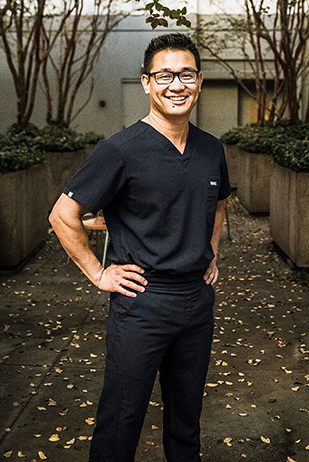April 12, 2010
Some Docs Find Lap-Band Ads Tough to Stomach
HEALTH CARE & BIOTECH: Beverly Hills
practitioners fear treatment is pushed as a quick fix.
By Deborah Crowe

The thousands of dollars that a controversial Beverly Hills surgery
center spent promoting its Lap-Band weight-loss procedure on billboards
around Los Angeles has been a mixed blessing for some lower-key
competitors in the 90210 ZIP code.
Dr. David Davtyan and Dr. Nicholas Nikolov appreciate the benefit
their own practices have received from the free publicity given to the
Lap-Band as a less invasive alternative to gastric bypass surgery.
But they are concerned that the procedure, which can cost $15,000 to
$18,000, is gaining a bad rap from being promoted by high-volume surgery
centers as a quick fix for patients with far less weight to lose than
the morbidly obese for whom the device was originally designed.
The Lap-Band is an inflatable silicone device placed around the top
portion of the stomach via a small surgical incision in the belly. It
assists weight-loss efforts by limiting how much food the wearer can
comfortably take in at any one time. While a serious surgical operation,
it is reversible and considered considerably less risky than gastric
bypass surgery, which permanently rearranges a patient’s
gastrointestinal tract.
A widespread radio and billboard campaign by a chain of affiliated
surgery facilities known as Weight Loss Centers features a svelte blonde
giving a thumbs-up while adjusting her scale downward as a banner urges
the obese to call 1-800-GET-THIN.
Davtyan was one of the first surgeons to perform the procedure in the
United States after it received regulatory approval in 2001. He’s also a
Lap-Band patient himself, having lost more than 90 pounds over two and a
half years after having a band inserted in Europe.
“As you can imagine from my experience, this is no quick fix,” he
said.
Nikolov, a Beverly Hills cosmetic surgeon, refers patients to Davtyan
when he feels they can benefit from the Lap-Band.
“Patients would come in for lipo or a tummy tuck when they really
just need to lose weight first before I work on them. But getting a
Lap-Band is not like going to Jenny Craig,” he said.
Officials at Weight Loss Centers, part of a Beverly Hills medical
partnership called TopSurgeons, did not return calls for comment.
TopSurgeons was founded by brothers Julian and Michael Omidi, who
have been cited by state regulators. The Medical Board of California
suspended Julian Omidi’s medical license in 2009, and put Michael Omidi,
a dermatologist, on probation for three years in 2008, citing gross
negligence, according to board records.
State health inspectors and national accreditation boards also have
cited some owned or affiliated surgery centers that specialize in
Lap-Band insertion.
‘Best-Kept Secrets’
Since taking over management of USC University Hospital and USC
Norris Cancer Hospital a year ago, the private university has been
busily remaking the institutions in its own image.
That’s meant plenty of hiring, lots of new equipment, and the
launching of several programs and initiatives. Now, the university has
begun promoting the new image in a marketing campaign.
“We are transforming from a large community hospital on a university
campus to a large academic hospital,” said Mitch Creem, chief executive
of the hospital on the USC Health Sciences campus in East Los Angeles.
Tenet Healthcare Corp. built University Hospital in 1991 and took
over management of Norris in 1997. USC filed a lawsuit in August 2006
seeking to end its relationship with Tenet, which was involved in a
Medicare billing scandal earlier in the decade that caused the company
to sell many of its hospitals.
Tenet countersued and the parties eventually settled, with USC buying
the facilities for $305 million in April 2009. The university committed
$275 million to modernize the hospitals and subsidize operations for
five years.
USC has since added more than 600 employees, bringing the total
headcount at the two facilities to 2,121. Many of the recent hires are
staffing a new 146-bed patient tower begun during the Tenet years.
Creem’s team, which still has roughly 340 positions to fill, also has
recruited specialists from academic institutions around the country to
run departments ranging from urology to neurosurgery.
The hospitals do not operate emergency rooms, so a 24-hour Evaluation
and Treatment Center was opened to enable existing patients more
flexibility to see doctors after hours.
Creem said employee satisfaction has significantly improved since the
takeover, with the turnover rate dropping from 20 percent to less than 8
percent.
“University Hospital and Norris Cancer Hospital are two of the
best-kept secrets in Los Angeles,” said Creem, noting that market
surveys indicated low public awareness of the two facilities, despite
both ranking high in certain specialties in national studies.
The billboard, print, Internet and radio campaign in Los Angeles and
Orange counties particularly promotes the hospitals’ bariatric,
cardiovascular, urology/prostate cancer and breast cancer programs.
– http://www.labusinessjournal.com/news/2010/apr/12/some-docs-find-lap-band-ads-tough-stomach/

